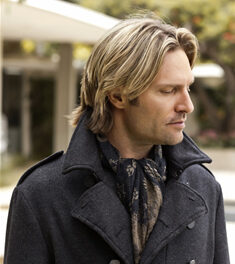In what is rapidly becoming an annual tradition, the North Carolina State University Chorale has again brought their Spring Concert to the friendly confines of Holy Trinity Lutheran Church. Directed by Nathan Leaf and accompanied by Virginia Vance, this group “is the premier choral ensemble at NC State University… The Chorale consists of approximately 50 student singers, all of whom are earning academic degrees in fields other than music.”
If you wanted to capture the essence of Bach’s choral music, you would go no further than his Jesu, meine Freude. The group opened with all but three of this great work’s eleven movements. The beginning Chorale No. 1 (“Jesus, my joy”), and its duplicate, the ending Chorale No. 11 (“Hence, you spirits of sadness”), are possibly this composer’s best-known choral pieces. Singers and accompanist were effective in bringing back these trusted old standbys.
Following this opener, Leaf and the singers moved about as far from J. S. Bach as you can get. Japanese composer Ko Matsushita (b. 1960) has penned an anthem of praise, “O lux beata Trinitas” (“O Trinity of blessed light”), not immediately accessible but no less exquisite. The a cappella treatment of this piece showed the singers in their most disciplined mode.
The next work, entitled simply, “Requiem,” called to mind a performance from three years ago by this same ensemble. The thoughts of the reviewer at that time are equally applicable here: “For moving power, though, nothing was quite on a par with “Requiem” by Eliza Gilkyson. Choral conductor Craig Hella Johnson has arranged this ‘neo-folk’ song into a choral work of the first order. Written in response to the dreadful Asian tsunami of December 2004, the text wails out that ‘all our homes are gone, our loved ones taken.’ The composer, who reportedly possesses no particularly religious leanings, asks Mother Mary to ‘come and carry us in your embrace…in the dark night of the soul.’” The appropriately somber performance could scarcely be improved upon.”
Strictly Americana offerings closed the program, arrangements of standards by the famed duo of Alice Parker (b. 1925) and Robert Shaw (1916-1999). There was the “Same Train” (…carry me to Heaven…) along with the plea to “Swing Low, Sweet Chariot.” A curious inclusion was “The Yellow Rose of Texas,” in which the piano was as active as the singers. A bonus offering was the N. C. State Alma Mater, eminently and lovingly well done without use of score (displaying an ever-alert attention to the director, a condition that would have enhanced all the other admittedly fine numbers).
The evening was “dark and stormy” in the Bulwer-Lytton sense. This brief Spring Concert offered the appreciative audience the type of haven that one might logically expect in a church called Holy Trinity.











